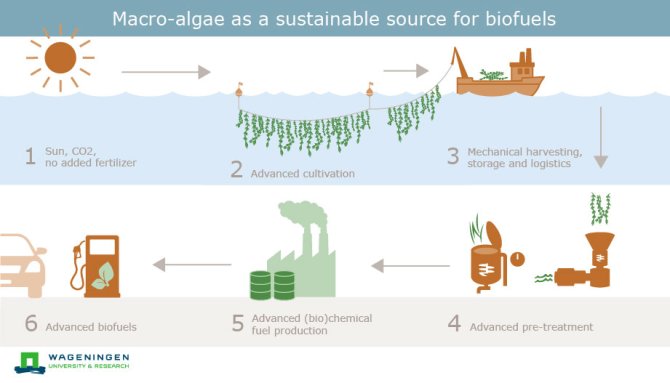Project
MACROFUELS: Macro-algae as a sustainable source for biofuels
Seaweeds or macroalgae are the fastest growing plants at the Northern EU latitude. To grow, seaweeds need only CO2, sunlight and the nutrients already present in the seas. By cultivating seaweeds in a rotating crop scheme, the MacroFuels-project will -for the first time in Europe- expand biomass availability for the production of advanced biofuels. This rotating crop scheme, combined with the use of innovative textile growing substrates, will dramatically reduce the cost price and boost the availability of seaweed.
In the MacroFuels-project, Wageningen University & Research Food & Biobased Research focuses on biorefinery and conversion technologies for seaweeds (such as pretreatment and fractionation) for a wide range of applications (fuels and materials) . Moreover, Food & Biobased Research will focus on advanced fermentation of seaweed sugars to (jet)fuel precursors (acetone, butanol and ethanol).

Meeting EU “20-20-20”-targets
Seaweeds are naturally high in sugars (with a sugar content of up to 50%), which makes them ideally suitable for the (bio)chemical production of advanced biofuels. By biorefining seaweed, the availability of advanced biofuels can be increased, which will contribute significantly to the EU “20-20-20”- targets. In these targets, the EU calls for advanced biofuels sourced from seaweed or certain types of waste (at least 2.5% of energy consumption in transport). Furthermore, the EU has proposed to reduce the use of land-based biomass for the production of biofuels.
Potential of seaweed for biofuels
The MacroFuels-project will expand biomass available for the production of advanced biofuels. Seaweed does not need fresh water, arable land or fertilizers to grow, which provides environmental benefits. In addition, it has a high carbon-dioxide reduction potential and reduces the demand for natural resources on land. The technology offers many novel opportunities for employment along the entire value chain.
Containing no lignin and cellulose, the processing and conversion steps for seaweed-based biofuels are different from those developed for lignocellulosic biomass. Seaweed does contain recalcitrant sugars, which can also be sulphated. A further challenge is the high intrinsic salt content of seaweed. The project team envisions using the high carbohydrate content of the seaweeds to produce advanced biofuels via efficient, commercially-viable and environmentally-benign bio- and thermochemical routes. The high levels of protein in some seaweed species will augment feed supply in the EU, whilst the high mineral content will contribute to closing the mineral fertilizer loop in the proposed processes.
- Unfortunately, your cookie settings do not allow videos to be displayed. - check your settings
MacroFuels-approach
MacroFuels aims to produce advanced biofuels from seaweeds. The targeted biofuels are ethanol, butanol, as well as furanics as fuel additive, and biogas. The project aims to achieve a breakthrough in biofuel production from macroalgae by:
- Increasing the biomass supply by developing a rotating crop scheme for cultivation of seaweed, using native, highly productive brown, red and green seaweeds;
- Improving the pre-treatment and storage of seaweed and to yield fermentable and convertible sugars at economically relevant concentrations;
- Increasing the bio-ethanol production to economically viable concentrations;
- Increasing the bio-butanol yield by developing novel fermenting organisms which metabolize all sugars in seaweeds;
- Increasing the biogas yield to convert available carbon in the residues by adapting the organisms to seaweed;
- Developing the thermochemical conversion of sugars to fuel additives?;
- Performing an integral techno-economic, sustainability and risk assessment of the entire seaweed to biofuel chain.
Wageningen University & Research Food & Biobased Research will focus on biorefinery and conversion technologies, such as pretreatment of seaweeds and advanced fermentation of seaweed sugars to (jet)fuel precursors (acetone, butanol and ethanol).
This project, ‘Developing the next generation Macro-algae based as a sustainable source for biofuels for transportation via advanced bio-refinery processes’ has received funding from the European Union’s Horizon 2020 research and innovation programme under grant agreement No 654010.